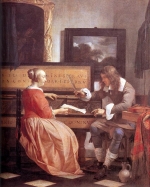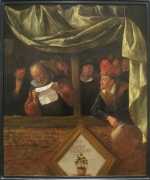De Nederlandse vriendenkring van E.W. von Tschirnhaus
article in Dutch only
Abstract:
The Dutch friends of E. W. von Tschirnhaus
In this article, the relations of the German scientist E.W. von Tschirnhaus with his Dutch friends is studied from what has remained of their correspondence. In 1669-1674, Tschirnhaus studied at Leiden, fought in the Dutch army, and became acquainted with Spinoza. In the letters from the following years, he appears to be on close terms with Dutch Spinozists as Jarich Jelles, Jan Rieuwerts, Georg Hermann Schuller, the Danish mathematician Georg Mohr, and Pieter van Gent, who until 1687 acted as his Amsterdam correspondent.
These men were in general very anxious to maintain their spiritual independence. Their ideal, as well as Tschimhaus's, was a life solely devoted to the pursuit of truth. Only in the course of time, some other people enter the correspondence for whom science was not so much a calling as a hobby: the merchant Ameldonk Blok and the broker Jan Makreel. Tschimhaus's truth seeking friends often experienced considerable difficulty in earning themselves a living. Not seldom they looked to Tschirnhaus for help in the form of recommendations, useful inventions, etc. When Ameldonk Blok got in financial difficulties, he negotiated the sale of Tschimhaus's burning-mirrors and burning-lenses at Amsterdam.
Tschirnhaus not only used his friends to provide him with news and books. He had his work Medicina mentis edited by them in Amsterdam, both in Latin and in a Dutch translation (by Blok). Eager to promote science, he also was ready to suggest, or pay for, the translation or publication of works by others than himself (e.g. Descartes, Bruno, Burnet). The results of the scientific application of his friends, however, seem to have been rather disappointing: little has seen the printing-press. Nevertheless, on an informal level there was a real involvement with science and mathematics which helped to shape Dutch scientific life.















